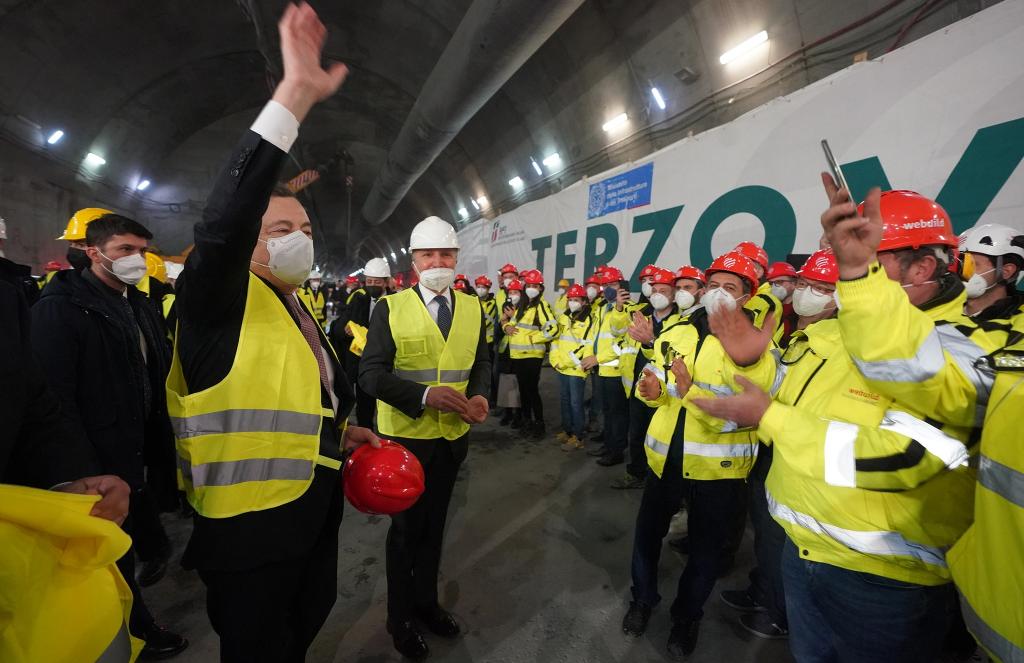Thessaloniki gets ready for its metro launch in November
The underground rapid transit lines have been under construction for almost two decades due to various project delays
 TheMayor.EU logo
TheMayor.EU logo 
Italian PM Mario Draghi during his visit to the excavation works, Source: Palazzo Chigi - Presidenza del Consiglio dei Ministri
The high-speed rail connection may increase the importance of Genoa as a commercial port
On Wednesday, 9 February, Italian Prime Minister Mario Draghi paid a visit to the Genoa Node of the Terzo Valico dei Giovi – a high-speed railway pass that has been under construction since 2013. The project is at 77% of completion and once finalized (presumably in 2025) it will allow for travel time between the cities of Genoa and Milan to be reduced by 33%.
In other words, it will be possible to reach one of these cities in as little as 50 minutes by mostly going under the mountainous and complex terrain that characterizes Liguria and Piedmont.
The project represents an important link of the Trans-European Transport Networks (TEN-T). More specifically, it is meant to form a part of the Rhine-Alpine corridor linking Northern and Southern Europe through a large system of tunnels.
The railway between the two major Italian cities will be 53 kilometres long, of which 36 kilometres will be tunnels (or 70% of the total).
Once completed, it will increase Italy's competitiveness, giving it greater centrality in trans-European connections. This will allow the integration of the Genoa network and its port in a way that makes it increasingly functional as an international hub, thanks to interconnections towards Turin, Milan and the rest of Europe.
Webuild, the company that has been contracted to do the excavating works (which are reportedly going at a non-stop, 24-7 rate) indicated that the construction process has been thought out according to all the latest standards of sustainability.
This ranges in details from construction sites integrated with the environment, to systems for the reuse of excavated materials, to the protection of water sources.
What’s more, apart from savings in travel time, the high-speed rail will also bring about a 29% reduction in energy consumption and a 55% reduction in CO2 emissions.

The underground rapid transit lines have been under construction for almost two decades due to various project delays

Now you can get your wine in Talence by paying directly in Bitcoin

That’s because the state has to spend money on updating the railway infrastructure rather than subsidizing the cost of the popular pass

Rethinking renewable energy sources for the urban landscape

The examples, compiled by Beyond Fossil Fuels, can inform and inspire communities and entrepreneurs that still feel trepidation at the prospect of energy transition

Now you can get your wine in Talence by paying directly in Bitcoin

The 10th European Conference on Sustainable Cities and Towns (ESCT) sets the stage for stronger cooperation between the EU, national and local level to fast track Europe's transition to climate neutrality.

At least, that’s the promise made by the mayor of Paris, Anne Hidalgo

The underground rapid transit lines have been under construction for almost two decades due to various project delays

At least, that’s the promise made by the mayor of Paris, Anne Hidalgo

Hostal de Pinós is located in the geographical centre of the autonomous region

Despite its church-y name, the district has long been known as the hangout spot for the artsy crowds

Urban dwellers across the EU are having a say in making their surroundings friendlier to people and the environment.

Forests in the EU can help green the European construction industry and bolster a continent-wide push for architectural improvements.

Apply by 10 November and do your part for the transformation of European public spaces

An interview with the Mayor of a Polish city that seeks to reinvent itself

An interview with the newly elected ICLEI President and Mayor of Malmö

A conversation with the Mayor of Lisbon about the spirit and dimensions of innovation present in the Portuguese capital














